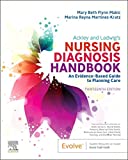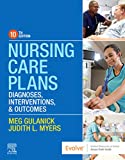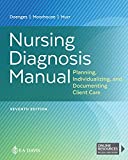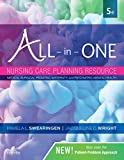Use this nursing care plan and management guide to help care for patients with febrile seizures. Learn about the nursing assessment, nursing interventions, goals and nursing diagnosis for febrile seizures in this guide.
Table of Contents
What are Febrile Seizures?
Febrile seizures are seizures that happen in children between the ages of 6 months and 5 years, they are associated with high fever but with an absence of intracranial infection, metabolic conditions, or previous history of febrile seizures. It is subdivided into 2 classifications: A simple febrile seizure is brief, isolated, and generalized while a complex febrile seizure is prolonged (duration of more than 15 minutes), focal (occurs in one part of the brain), or multiple (occurs more than once within 24 hours).
Febrile seizures most often occur within 24 hours of the onset of fever and can be the first indication that a child is sick. Symptoms may include a high fever (102°F to 104°F [38.9°C to 40°C]), sudden loss of consciousness, eye-rolling, involuntary moaning, crying, and passing of urine, rigid (stiff) limbs, apnea or jerky movements on one side of the body (such as arm and leg).
Nursing Care Plans and Management
Nursing care plan and management for a child with febrile seizures include maintaining airway/respiratory function, maintaining normal core temperature, protecting from injury, and providing family information about the disease process, prognosis, and treatment needs.
Nursing Problem Priorities
The following are the nursing priorities for patients with febrile seizures:
- Ensure patient safety during the seizure episode.
- Monitor and assess the duration and characteristics of the seizure.
- Administer appropriate antipyretic medications as prescribed to control fever.
- Provide emotional support and education to the patient and their caregivers regarding febrile seizure management and prevention.
- Collaborate with the healthcare team to identify and address the underlying cause of the fever.
Nursing Assessment
Assess for the following subjective and objective data:
- Rapid onset and short duration of the seizure (typically less than 5 minutes)
- High body temperature (usually above 100.4°F or 38°C)
- Loss of consciousness
- Convulsions or rhythmic jerking movements of the body
- Stiffening or tightening of the muscles
- Rolling or deviation of the eyes
- Frothing or foaming at the mouth
- Urinary incontinence
- Post-seizure sleepiness or confusion
Nursing Diagnosis
Following a thorough assessment, a nursing diagnosis is formulated to specifically address the challenges associated with febrile seizures based on the nurse’s clinical judgment and understanding of the patient’s unique health condition. While nursing diagnoses serve as a framework for organizing care, their usefulness may vary in different clinical situations. In real-life clinical settings, it is important to note that the use of specific nursing diagnostic labels may not be as prominent or commonly utilized as other components of the care plan. It is ultimately the nurse’s clinical expertise and judgment that shape the care plan to meet the unique needs of each patient, prioritizing their health concerns and priorities.
Nursing Goals
Goals and expected outcomes may include:
- The child will maintain a patent airway.
- The child will demonstrate temperature within normal range and will not experience complications.
- The child will be free from injury when a seizure occurs.
- The parents will obtain information regarding the care of the child.
Nursing Interventions and Actions
Therapeutic interventions and nursing actions for patients with febrile seizures may include:
1. Maintaining Patent Airway
To maintain airway patency during febrile seizures, it is vital to follow a few key steps. First, ensure a safe environment by removing any objects that may pose a risk of injury. Second, position the child on their side to prevent choking and facilitate drainage of saliva or vomit. Lastly, avoid restraining the child during the seizure, as it may increase the risk of airway obstruction, and closely monitor the duration and characteristics of the seizure for any concerning signs that may require immediate medical attention.
Assess the child’s airway patency using the look, listen, and feel approach.
This will ensure that seizure does not affect the supply of oxygenated blood to the brain and prevent the development of hypoxia.
Auscultate lungs for the presence of normal or adventitious breath sounds.
Abnormal breath sounds can be heard as fluid and mucus accumulate. This may indicate airway is obstructed.
Place the child on a flat surface then turn the head to the side during a seizure episode.
Turning the child’s head to the side helps in maintaining a patent airway by promoting drainage of secretions and avoiding aspiration to the lungs.
Loosen any restrictive clothing, especially on the neck, chest, and abdomen.
This will facilitate ease of breathing and maintain an unobstructed airway.
Suction secretions gently as indicated.
Suctioning will eliminate secretions and decreases the possibility of aspiration.
Provide supplemental oxygenation as indicated.
Oxygen therapy is prescribed to improve oxygen saturation and reduce possible complications.
Prepare for/assist with possible intubation as indicated.
Extended apnea episodes after a seizure may require a need for ventilatory support.
2. Managing Fever
Fever is the underlying trigger for febrile seizures in children. Febrile seizures are generally associated with rapid rises in body temperature and commonly occur during the initial phase of a febrile illness. It is important to manage and treat the fever promptly to help prevent recurrent febrile seizures and provide comfort to the child.
Monitor the child’s temperature (tympanic or rectal temperature).
Most febrile seizures happen when the temperature is greater than 102.2 ºF (39ºC). It usually occurs within the first 24 hours of illness and close monitoring of temperature is essential.
Assess for hydration status.
A high body temperature increases the metabolic rate and hence increases the insensible fluid loss.
Eliminate excess clothing.
Exposing skin to room air decreases warmth and increases evaporative cooling.
Administer a tepid sponge bath.
External sponging reduces the body temperature and increases comfort.
Advise the mother to avoid applying cold water or alcohol to the child.
Extreme cooling can result in a shock to a child with an immature nervous system; While applying alcohol can cause dry skin.
Administer antipyretic as indicated.
See Pharmacologic Management
3. Preventing Injury
During a febrile seizure, the child is prone to injury due to the uncontrollable movements and loss of consciousness. They may fall, hit objects, or experience accidental trauma during the seizure episode. It is vital to create a safe environment by removing any potential hazards, cushioning the area around the child, and closely monitoring the child to prevent injuries during the seizure.
Assess and record seizure activity and location. Note the duration of seizures, parts of the body involved, and site of onset and progression of seizure.
Documentation of information is essential for the prevention of injury or complications as a result of a seizure.
Assess skin for pallor, flushing, or cyanosis; Monitor respiratory rate, depth, and signs of respiratory distress.
Once seizures are prolonged and respiration is compromised, this will provide information on possible signs of aspiration of secretions.
Maintain side-lying position; Keep padded side rails up with the bed in the lowest position and removed any clutter from the child.
Side-lying facilitates drainage of secretions and maintains airway patency; padding protects the child from injury during a seizure.
Avoid restraining the child or putting anything in his/her mouth; provide gentle support to the head and arms if harm might result.
Restraining a child can result in trauma due to the amount of force exerted; inserting an object in the mouth increases stimuli; Padding the area helps to protect the head from injury.
Stay with the child during the phase of seizures, reorient when awake, and allow to rest or sleep after an episode.
Provides support and prevents any injury to the child.
Advise parents to remain calm during the seizure activity of the child.
Allows parents to function properly to protect the child from injury.
Teach information to record about seizure activity should it occur (specify).
Provides physicians with important information needed to prescribe medical regimens.
Educate the parents regarding precautionary measures during a seizure.
Guarantees safe and effective interventions to avoid the incidence of injury.
Administer medications as indicated.
See Pharmacologic Management
4. Administer Medications and Provide Pharmacologic Support
Antipyretics, such as acetaminophen or ibuprofen, are commonly used in febrile seizures to help reduce fever and alleviate associated symptoms. However, it is important to note that antipyretics do not specifically target or prevent seizures and are primarily used to manage fever. Anticonvulsants, on the other hand, are used if the febrile seizure is prolonged or recurrent to stop the seizure and prevent complications.
Acetaminophen (Tylenol)
Lowers fever by directly acting on the hypothalamic heat-regulating centers that promote the distribution of body heat through sweating and vasodilation.
Ibuprofen (Advil)
A nonsteroidal anti-inflammatory drug (NSAID) that inhibits the production of prostaglandins (chemicals that promote inflammation, pain, and fever).
Phenobarbital (Luminal)
This is a central nervous system depressant that acts as an anticonvulsant by decreasing the seizure threshold.
Carbamazepine (Tegretol)
This is an anticonvulsant that works by decreasing nerve impulses that cause seizures and pain.
Diazepam (Valium)
This is an anticonvulsant drug that can reduce the risk of recurring febrile seizures.
5. Initiating Patient Education and Health Teachings
There may be insufficient knowledge about febrile seizures among parents, and caregivers, leading to confusion and anxiety about how to manage the condition. This can result in delays in seeking appropriate treatment or implementing preventative measures, which can increase the risk of complications. Education and awareness about febrile seizures are crucial for the effective management and prevention of future episodes.
1. Assess parents’ perceptions and knowledge about disease conditions, fears, and misconceptions about the disorder, nature, and frequency of seizures.
Provides information regarding the long-term care of a child with a seizure disorder and how to deal with seizures and the stigma attached to this disorder.
1. Educate parents that a febrile seizure is more of a symptom of fever than a long-term condition.
Understanding this information can help the parent understand the responsibility to take for future care.
2. Advise parents and child to report dizziness, drowsiness, gastrointestinal upset, nausea, vomiting, photosensitivity, and rash.
These are the side effects of anticonvulsants and sedatives.
3. Inform parents about the need for follow-up laboratory studies such as blood count and liver function tests as indicated.
Prevents toxicity and other severe side effects of drug therapy by adjusting the dosage or changing medications.
4. Inform that seizures may be provoked by an illness or infection, hyperactivity, lack of sleep, abrupt discontinuation of medication, emotional stress, or other causes specific to the child.
Increases knowledge and understanding of causes of increased frequency of seizures.
5. Advise parents to supervise the child in the bathroom, avoid exposure to incidents that trigger a seizure, avoid dangerous play and toys, pad areas in bed, or wear protective clothing if needed.
Provides precautions to prevent injury as a result of a seizure.
6. Encourage parents to notify the school nurse and teach of the disorder and actions to take including a telephone number to call.
Promotes knowledge and understanding to prevent injury and embarrassment to the child.
7. Discuss any activity restrictions such as sports, rough play, need for someone in attendance.
Promotes knowledge of activity based on individual child and seizure activity and response to therapy.
8. Alert parents of possible changes in behavior, activity, or personality or changes in school performance or interactions with family and peers.
Indicates effects of anticonvulsants on behavior and learning.
Recommended Resources
Recommended nursing diagnosis and nursing care plan books and resources.
Disclosure: Included below are affiliate links from Amazon at no additional cost from you. We may earn a small commission from your purchase. For more information, check out our privacy policy.
Ackley and Ladwig’s Nursing Diagnosis Handbook: An Evidence-Based Guide to Planning Care
We love this book because of its evidence-based approach to nursing interventions. This care plan handbook uses an easy, three-step system to guide you through client assessment, nursing diagnosis, and care planning. Includes step-by-step instructions showing how to implement care and evaluate outcomes, and help you build skills in diagnostic reasoning and critical thinking.

Nursing Care Plans – Nursing Diagnosis & Intervention (10th Edition)
Includes over two hundred care plans that reflect the most recent evidence-based guidelines. New to this edition are ICNP diagnoses, care plans on LGBTQ health issues, and on electrolytes and acid-base balance.

Nurse’s Pocket Guide: Diagnoses, Prioritized Interventions, and Rationales
Quick-reference tool includes all you need to identify the correct diagnoses for efficient patient care planning. The sixteenth edition includes the most recent nursing diagnoses and interventions and an alphabetized listing of nursing diagnoses covering more than 400 disorders.

Nursing Diagnosis Manual: Planning, Individualizing, and Documenting Client Care
Identify interventions to plan, individualize, and document care for more than 800 diseases and disorders. Only in the Nursing Diagnosis Manual will you find for each diagnosis subjectively and objectively – sample clinical applications, prioritized action/interventions with rationales – a documentation section, and much more!

All-in-One Nursing Care Planning Resource – E-Book: Medical-Surgical, Pediatric, Maternity, and Psychiatric-Mental Health
Includes over 100 care plans for medical-surgical, maternity/OB, pediatrics, and psychiatric and mental health. Interprofessional “patient problems” focus familiarizes you with how to speak to patients.

See also
Other recommended site resources for this nursing care plan:
- Nursing Care Plans (NCP): Ultimate Guide and Database MUST READ!
Over 150+ nursing care plans for different diseases and conditions. Includes our easy-to-follow guide on how to create nursing care plans from scratch. - Nursing Diagnosis Guide and List: All You Need to Know to Master Diagnosing
Our comprehensive guide on how to create and write diagnostic labels. Includes detailed nursing care plan guides for common nursing diagnostic labels.
Other nursing care plans for pediatric conditions and diseases:
- Acute Glomerulonephritis | 4 Care Plans
- Acute Rheumatic Fever | 4 Care Plans
- Apnea | 4 Care Plans
- Brain Tumor | 3 Care Plans
- Bronchiolitis | 5 Care Plans
- Cardiac Catheterization | 4 Care Plans
- Cerebral Palsy | 7 Care Plans
- Child Abuse | 4 Care Plans
- Cleft Lip and Cleft Palate | 7 Care Plans
- Congenital Heart Disease | 5 Care Plans
- Congenital Hip Dysplasia | 4 Care Plans
- Croup Syndrome | 5 Care Plans
- Cryptorchidism (Undescended Testes) | 3 Care Plans
- Cystic Fibrosis | 5 Care Plans
- Diabetes Mellitus Type 1 (Juvenile Diabetes) | 4 Care Plans
- Dying Child | 4 Care Plans
- Epiglottitis | 5 Care Plans
- Febrile Seizure | 4 Care Plans
- Guillain-Barre Syndrome | 6 Care Plans
- Hospitalized Child | 5 Care Plans
- Hydrocephalus | 5 Care Plans
- Hypospadias and Epispadias | 4 Care Plans
- Intussusception | 3 Care Plans
- Juvenile Rheumatoid Arthritis | 4 Care Plans
- Kawasaki Disease | 6 Care Plans
- Meningitis | 7 Care Plans
- Nephrotic Syndrome | 5 Care Plans
- Osteogenic Sarcoma (Osteosarcoma) | 4 Care Plans
- Otitis Media | 4 Care Plans
- Scoliosis | 4 Care Plans
- Spina Bifida | 7 Care Plans
- Tonsillitis and Adenoiditis | 4 Care Plans
- Umbilical and Inguinal Hernia | 4 Care Plans
- Vesicoureteral Reflux (VUR) | 5 Care Plans
- Wilms Tumor (Nephroblastoma) | 4 Care Plans
